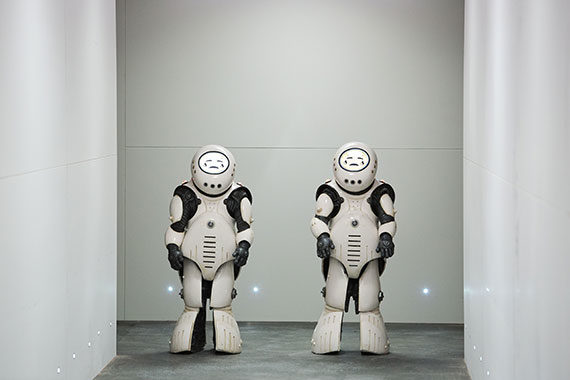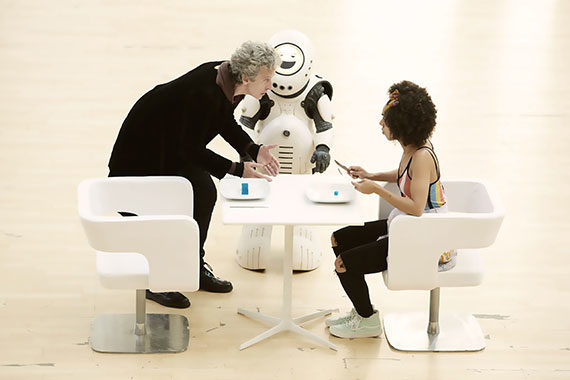2nd Opinion: Smile
Connor Johnston & Gustaff Behr give their verdicts on the second episode of Series 10.
Connor’s Verdict

It continues to amaze me that despite being a show whose main premise is rooted within the concept of travelling to any time in the history of the future, episodes of Doctor Who consistently (and ironically) double as a snapshot of the time in which the episode is created. From Bill’s first action upon arriving in the city to be taking a selfie, recent throwaway dialogue referencing ‘food sexism’, ‘browser history’, ‘Netflix’, ‘texting’; as well as a plot that by association touches upon humanity’s current obsession with presenting a guise of ‘happiness’ through our online profiles – Smile is a script that could have only been written in current times. This of course excludes the most telling factor, being that the ‘monster of the week’ is a robot that endorses the use of something uniquely contemporary in terms of relevance and imagery: Emojis.
When the use of Emojis was first teased months before the series premiered, I remember tittering on the edge of apathy and disappointment. It must have been a gimmick, a trope – there was no possibility in my mind that the concept of the Vardi could have any narrative importance or significance above superficial justifications. Having watched the episode, it could not be clearer how wrong I was to pre-judge Cottrell-Boyce’s creative decisions.
Building from within its own premise, Smile is a story about communication and understanding – something Doctor Who rarely acknowledges as a significant point of divide between different races. Be it the Vardi’s inability to process the idea of grief as anything but “the enemy of happiness” or the settler’s reaction to this possessing the same inability to attribute the Vardi’s actions to anything but a threat – the script works as a case study into how crucial communication, understanding and negotiation is in every conflict or relationship.
Cottrell-Boyce’s early dialog referring to the Doctor’s piloting of the TARDIS as a ‘negotiation’ further ties into both the episode’s standalone theme of examining the relationship between man and machine, as well as the episode’s structural obligation in introducing both the audience and Bill to the show’s universe. Marry this point with the episode’s motivation being Bill’s curiosity regarding how happy the future is, as well as the consequences of said trip addressing the confronting notion of having prior knowledge of destruction – and all too quickly the tactic of pitching an episode featuring robots that use a language based on moods and emotions doesn’t seem so superficial and flippant after all.
Easily a more conventional and ‘safer’ script than his last, Cottrell-Boyce’s second contribution to the world of Doctor Who is thrilling, layered and strong enough to make an impact among a number of ‘Monster of the Week’ standalone adventures. Director Lawrence Gough has once again captured the scale and spectacle of the series with ease; and with Capaldi and Mackie’s dynamic continuing to cement itself; the pair’s abilities remain unstrained and utterly convincing. Thought provoking and thoroughly entertaining, the only reaction one feels would be appropriate would be a simple… smile.
Gustaff’s Verdict

Give us a smile…
When I first heard about the premise for Smile, which included the words “Emoji bots”, much like Connor, I couldn’t help but make a frowny face. It truly did feel like a gimmick and that Doctor Who was once more trying to imitate Hollywood since we’re only a few months away now from The Emoji Movie.
Yes. Emoji movies…
But to my complete surprise, all the propaganda surrounding the Emoji bots turned out to be just that: Propaganda. Emojis do not take over the narrative, nor are they used as a cheap gimmick to appeal to younger audiences. In a lot of ways, after having watched the episode twice now, it feels as though the concept of emojis is mere accessories to the episode rather than the dominant, pass paraded factor.
However the creative use of emotions throughout this episode is to be applauded. From negative emotions as plague to badges which display your emotions to everyone except you. Emotions are also used sparsely in a few comedic, yet effective scenes?.
My position on In The Forest of the Night hasn’t changed, nor do I believe it ever will, but I can honestly declare that for the most part, I genuinely enjoyed Smile and consider it a major step up. For the second week in a row, the character dynamic between the Doctor and companion continues to boost this episode’s score for me. The friendship here is truly believable and Pearl Mackie as Bill Potts continues to prove herself a memorable companion, whether she is showing just how good she’d be at “CinemaSins”, picking up obscure or irrelevant details of the mythology or showcasing her acting chops during a brief, but all too emotional scene. Peter Capaldi I believe had the funniest lines throughout the story, but without making him feel out-of-character and I am genuinely enjoying his Doctor’s more confident and consistent characterization this season.
But perhaps the most praiseworthy element about this story is the choice of location. I have no idea who discovered/suggested the City of Arts and Sciences in Valencia, but I sincerely hope that he or she got a big raise that day because the visuals are breathtaking. It looks even better devoid of people.
Imagine for a moment the city as a painting and the people that populate it as smudges on the glass between you and it. Smile for the most part wipes away all smudges and does an impressive job pimping out its filming location to the viewer.
Unfortunately, Smile isn’t without its problems. While the interactions between Bill and the Doctor, coupled with the clever use of emojis and the stunning visuals, for the second week in a row, Doctor Who chooses to be a “hybrid” of old episodes rather than present the viewer with something new.
The Doctor and companion arrive at a location in the distant future; devoid of life before facing off against a swarm that devours you in seconds is pretty much the plot for the Silence in the Library 2-parter. In fact, the tiny robots even feel like the Vashta Nerada, except with a name change. While the concept of being happy or risk dying is lifted straight from 1988s The Happiness Patrol.
And while it’s only natural that nothing can ever truly be considered 100% original and while it’s true that it isn’t necessarily wrong for Doctor Who to mine its past in order to sustain its future, it is lazy when those elements you mined are not particularly well hidden. Yes this is a soft reboot, but the last 50+ years of the show did still happen for most of us at home. If your audience can instantly recognize where and when you lifted your plot from, you need to either come up with something else or try harder hide it better.








